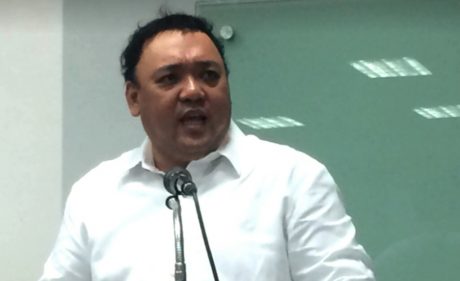By Orion Perez D
Fellow Filipinos:
There's still so many of us who make this fatal mistake of easily believing in the FUD-attacks (Fear, Uncertainty, and Doubt) made by the enemies of Progress.
One main reason for why some Filipinos are hesitant to support the push for Federalism is because they have sadly been brainwashed by repetitive Goebbelian lies propagated in Mainstream Media. One such lie was invented by both Christian and Winnie Monsod and it has infected so many Filipinos to wrongly believe that "Federalism will cause/worsen warlords and dynasties to emerge."
In all my more than 20+ years of research on Federalism, I have not once come across any whitepaper or dissertation by any renowned PhD who has proven such a claim. In fact, a simple google search with those keywords "warlords, dynasties, federalism" will reveal that all of the search results point to Pinoy-authored utterances, blogs, comments, wrong opinions, etc.
In short, the idea that "Federalism will worsen Warlords and Dynasties" is an "onli-in-da-Pilipins" shtick!
Think about it.
Australia, Austria, Canada, Germany, Malaysia, Switzerland.. They all use Federalism. But do they have a warlords-and-dynasties problem?
No they don't.
And yet the Philippines which is Unitary clearly has a severe warlords and dynasties problem. So why blame Federalism when Federalism has nothing to do with this?
See, fellow Filipinos, the problem is Feudalism, not Federalism. Federalism does NOT cause warlords and dynasties to emerge or worsen.
The Philippines does not have Federalism, yet we have warlords and dynasties because our economic system and economic structure is still very much based on Feudalism.
Australia, Austria, Canada, Germany, Malaysia, Switzerland all use Federalism but they don't have the warlords and dynasties problem because they don't have Feudalism.
Let me explain how the economic system plays a role...
The Philippines is essentially Feudal because in the rural areas, there are lots and lots of poor people and just a handful of rich people, sometimes just one family of landowners in one area.
The poor people can barely feed themselves or if they are able to, they have no money for emergencies or important events. So they generally ask help from the few rich people in their area.
If they need to pay for hospitalization bills, tuition fees, costs for weddings, or just simply need to borrow money, they go to the rich landowner in the area and obsequiously ask for assistance.
The rich don then helps out and this peasant now becomes indebted to the don. Come election time, when the don or his son runs for office, the rich family calls upon the poor peasants whom they've helped out to help campaign for them and vote for them in the elections. The grateful peasants who owe them a debt of gratitude then happily comply, thanking them for their assistance.
See what's wrong with this scenario?
Why are these people so poor and pathetically penniless that they need to ask help from the don anyway?
Simple. Something is seriously wrong with the Philippines' economic system. We don't create enough jobs for our people, and whatever few jobs exist don't pay enough to allow one to live decently.
This issue continues on election after election, causing the members of the same family to keep winning since (1) everyone is indebted to the same family and (2) there's no one rich enough to run against the incumbent because everyone else is so poor.
This is why we have dynasties.
It doesn't help that the Philippine Presidential System's popularity-centric dynamics cascades downwards to the level of provincial governor, and down to mayor. Voters vote candidates based on their names, not parties, and with a Feudalistic system of personal loyalties that results from the debt of gratitude that poor peasants have when the rich don in the area helps them out with favors - usually related to money, it's no surprise that dynasties flourish.
It's worse when the dynasties have a violent streak and hire goons and thugs from among the peasant families that owe them a debt of gratitude. These dynasties become warlords because of their private armies of goons and thugs.
But had there been enough good economic opportunities and jobs in the area, would these people have signed up to become goons and thugs? No.
Everything all boils down to ECONOMICS.
Federalism has absolutely NOTHING to do with warlords and dynasties.
It's FEUDALISM that you should be pointing at, not Federalism.
I'm surprised that this issue still lingers on as a showstopper and mindblocker for so many Filipinos. I've talked about this in my videos and have posted a lot about this. And still some people haven't gotten up to speed on this.
Disabuse yourselves of that fake-news notion that "Federalism will worsen Warlords and Dynasties." Because if there had been an iota of Truth to it, then why is it that Australia, Austria, Canada, Malaysia, Switzerland don't have any of these warlords and dynasties issues?
To be fair, Austria, Germany, and Malaysia once did: they used to have Feudalism and this is found in the fact that Malaysia still has Royalty, while Austria & Germany used to have a Royal Family plus a Peerage (Nobility). But rapid industrialization and economic development and job creation have rendered the old nobility largely ceremonial and merely titular. In Malaysia, there are royal families, but their roles have been relegated to mostly ceremonial or titular religious ones (Sultans are traditionally the heads of Islam within their states). In modern Austria, they've even phased out surnames of the Nobility that have "von" as a prefix (a sign of coming from a noble/aristocratic family). The ones who retain "von" in their surname are dead people in history books or those who emigrated to the US or elsewhere before the "von" phaseout happened. (I'm not so sure about Germany, but it seems some lighter form of phase-out happened too)
Economic Development and massive job-creation is what will cure the Philippines of our warlords and dynasties issues. Removing the anti-FDI restrictions in the constitution and allowing massive amounts of foreign direct investment and inviting large numbers of multinational corporations to set up factories and offices will help immensely. But Federalism is needed, because Federalism will allow the regional governments to set up the necessary policies aimed at attracting these companies to locate their offices and factories in their areas. We can't have all these companies setting up in Metro Manila. They need to spread out to the regions and create jobs for the people in the regions.
Develop the economy by inviting in lots of foreign direct investors to jumpstart the economy and create massive amounts of jobs for the people in the regions and notice how warlords and dynasties will weaken. In fact, as new rich people will emerge, there will be new people emerging as political contenders challenging the old order. The creation of a large middle class will cause people to vote more based on principle and less based on "utang-na-loob" (debt of gratitude).
Filipinos need to learn to be more scientific and analytical. We need to stop getting swayed by repetitive Goebbelian rhetoric that aims to brainwash us subliminally.
Remember, folks, it is not Federalism that empowers warlords and dynaties... It is FEUDALISM!
Do not confuse the two just because both start with FE and end with ALISM. Feudalism and Federalism are DIFFERENT FROM EACH OTHER!
Now you know!








